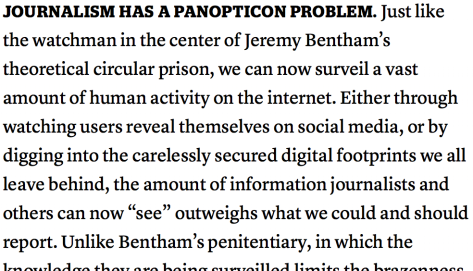A Facebook page set up to share court reports from Cornwall Live – run by editorial staff – is filled with comments that reveal the understanding that some of its 12,000-plus followers have of the justice system in England and Wales. Read it here.

A Facebook page set up to share court reports from Cornwall Live – run by editorial staff – is filled with comments that reveal the understanding that some of its 12,000-plus followers have of the justice system in England and Wales. Read it here.

Police rebuked national media for using Facebook pictures of a boy who had been mauled to death by a dog, but a local site baulked at doing so – and won the family’s trust. Read more.
IPSO rejected a complaint from pop star Jamelia after she was named in a newspaper report about her estranged step-brother, who was convicted of murder. The Editor’s Code says relatives of criminals should not normally be identified unless relevant. The paper said there was a public interest because the killer was only the second person in the UK to stand trial under a pseudonym. Significantly, he named the star in his application for reporting restrictions, saying the case was receiving heavy media coverage because she was a “close relation”. Read more here.
Dishonesty online is being passed off as satire and humour by political parties and activists responsible for fake videos and websites, says Alastair Reid of First Draft News in an article published by journalism.co.uk. That’s his response to a video faked by the Conservative Party and then published on its official Twitter account, falsely showing Labour’s shadow Brexit secretary unable to answer a question on TV. The BBC’s Andrew Neil had to apologise for sharing a manipulated video of an SNP politician during the 2019 general election. Facebook subsequently said it would ban some deepfake political videos – but not all. It’s a hazard for journalists who need to be wary of being taken in, as happened with a fake website for US election contender Joe Biden. It’s also of interest because satire can be used as a defence in a defamation case.
A voluntary system of press regulators, set up by the industry itself, was criticised as “the press marking their own papers” in the wake of the phone hacking scandal. But outcoming regulator Sir Alan Moses told a media freedom conference: “Voluntary self-regulation is the only way that freedom of expression may safely and reliably be preserved.” The alternative – state control – creates a risk of a government controlling what the public know or using unregulated social media to create confusion.
The speech described the workings of the Independent Press Standards Organisation and the guidance it gives on issues such as reporting suicide and transgender issues.
Read a transcript here.
See Sir Alan speaking on the same theme at another conference (starts at 9.40):
Emily Bell, one of the world’s most highly respected commentators on media, has written a post for the Columbia Journalism Review that draws together strands of important thinking on the dilemmas involved in terrorism fed by social media, and the emerging wisdom on the ethics involved for mainstream media in following it. Messages include: “Do not report facts until they are verified, do not focus on the perpetrator over the victims, do not use sensational language that might glamorize the terrorist.” Read it here (and find many more internationally-focused articles on the media in the same place).

A former MP complained of breach of privacy after The Sun published photographs of him allegedly “nuzzling” his face in a friend’s breasts. The Independent Press Standards Organisation found in favour of the MP on privacy grounds, saying there was no public interest justification. A further complaint on grounds of accuracy was not upheld. Press Gazette’s account of the saga shows the reasoning behind the ruling. Read it here.
An American journalist issued the Daily Telegraph with a writ for libel after it published a lengthy apology for “errors” in her article about Melania Trump. Nina Burleigh’s writ accused the Telegraph Media Group of “capitulating abjectly” to a legal threat from a lawyer known as a “slayer”, and had wrongly turned her into “a poster girl for fake news”.
The writ detailed how the paper apologised – without consulting her – for statements the article did not contain, and for fact-checked and well-sourced material. It gave a detailed breakdown showing how the apology allegedly misquoted the original article.
Read the writ here.
An app warned users going to the Mail Online website that it failed to maintain “basic standards of accuracy and accountability”. Mail Online called for the app’s removal from Microsoft’s Edge browser. Note: we’re not told the basis of claims of inaccuracy; simply that Mail Online didn’t respond to queries from analyists working for the app – hence the reference to accountability? Read more (source: BBC).
As of the middle of 2018, there was no regulator for social media in the UK, noted the Independent Press Standards Organisation (IPSO) in its blog on 13 July 2018. A tricky topic: is it really feasible to regulate the content of individual users? Can platforms realistically keep on top of all the content?
Across the European Union, TV and on-demand video is regulated under the Audio Visual Media Services Directive (known as the AVMS Directive). In Britain the actual work of regulating broadcast and on-demand is carried out by Ofcom.
At the start of 2019, video on newspaper and magazine websites was not regulated by Ofcom: it fell under the ambit of the print and online regulators – IPSO for most publishers. The same was true for online-only publications signed up to IPSO.
The EU could change that.
Proliferation of multi-media content meant “newspaper websites could, in theory, start to resemble video-sharing platforms,” said the IPSO blog.
But this website notes that the ethical codes for newspaper sites are nowhere near as demanding as for broadcast media.
Read the full IPSO blog post here.